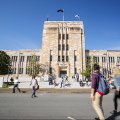Computers can be used to identify cancer treatment targets that wouldn’t otherwise have been considered, according to research by an Australian team.
Professor Mark Ragan from The University of Queensland’s Institute for Molecular Bioscience (IMB), who led the research team, says they found that computational methods could be used to untangle the intricacies of cancer biology.
“Cancer is not a disease caused by single genes. Rather, it is changes to the underlying gene regulatory networks that prompt tumours to grow and spread,” he said.
“Understanding gene regulatory networks in healthy and diseased tissues is therefore critical to devising effective cancer treatments.
“These networks involve vast numbers of interactions between different molecules, making conventional experimental approaches, which are focused on individual genes, too time-consuming,” he said.
The findings came from the team’s analysis of different computational methods of studying gene regulatory networks.
By contrast, computational methods can examine complex networks of interacting molecules across entire systems. The challenge for researchers is determining the accuracy of such methods.
The IMB team undertook a thorough analysis of nine different computational methods that represented a variety of approaches. They then took the method judged most effective and applied it to real ovarian cancer data.
“Our evaluation demonstrated that it’s possible in some cases to use computational methods to gain insights into cancer biology.
“These methods can pinpoint targets that wouldn’t otherwise have been considered, which can then be validated with laboratory experiments.”
The findings are published in the current edition of the scientific journal Genome Medicine, where it has been nominated as part of the thematic series Cancer bioinformatics: bioinformatic methods, network biomarkers and precision medicine.
Subscribers can access the paper here and view the series here.
Media: Professor Mark Ragan (07 3346 2616 or m.ragan@imb.uq.edu.au) or IMB Communications (07 3346 2134 or 0418 575 247).













